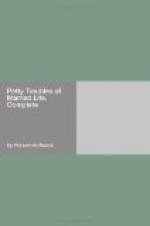WITHOUT AN OCCUPATION.
“PARIS, 183-
“You ask me, dear mother, whether I am happy with my husband. Certainly Monsieur de Fischtaminel was not the ideal of my dreams. I submitted to your will, as you know. His fortune, that supreme consideration, spoke, indeed, sufficiently loud. With these arguments, —a marriage, without stooping, with the Count de Fischtaminel, his having thirty thousand a year, and a home at Paris—you were strongly armed against your poor daughter. Besides, Monsieur de Fischtaminel is good looking for a man of thirty-six years; he received the cross of the Legion of Honor from Napoleon upon the field of battle, he is an ex-colonel, and had it not been for the Restoration, which put him upon half-pay, he would be a general. These are certainly extenuating circumstances.
“Many women consider that I have made a good match, and I am bound to confess that there is every appearance of happiness,—for the public, that is. But you will acknowledge that if you had known of the return of my Uncle Cyrus and of his intention to leave me his money, you would have given me the privilege of choosing for myself.
“I have nothing to say against Monsieur de Fischtaminel: he does not gamble, he is indifferent to women, he doesn’t like wine, and he has no expensive fancies: he possesses, as you said, all the negative qualities which make husbands passable. Then, what is the matter with him? Well, mother, he has nothing to do. We are together the whole blessed day! Would you believe that it is during the night, when we are the most closely united, that I am the most alone? His sleep is my asylum, my liberty begins when he slumbers. This state of siege will yet make me sick: I am never alone. If Monsieur de Fischtaminel were jealous, I should have a resource. There would then be a struggle, a comedy: but how could the aconite of jealousy have taken root in his soul? He has never left me since our marriage. He feels no shame in stretching himself out upon a sofa and remaining there for hours together.
“Two felons pinioned to the same chain do not find time hang heavy: for they have their escape to think of. But we have no subject of conversation; we have long since talked ourselves out. A little while ago he was so far reduced as to talk politics. But even politics are exhausted, Napoleon, unfortunately for me, having died at St. Helena, as is well known.
“Monsieur de Fischtaminel abhors reading. If he sees me with a book, he comes and says a dozen times an hour—’Nina, dear, haven’t you finished yet?’
“I endeavored to persuade this innocent persecutor to ride out every day on horseback, and I alleged a consideration usually conclusive with men of forty years,—his health! But he said that after having been twelve years on horseback, he felt the need of repose.
“My husband, dear mother, is a man who absorbs you, he uses up the vital fluid of his neighbor, his ennui is gluttonous: he likes to be amused by those who call upon us, and, after five years of wedlock, no one ever comes: none visit us but those whose intentions are evidently dishonorable for him, and who endeavor, unsuccessfully, to amuse him, in order to earn the right to weary his wife.




